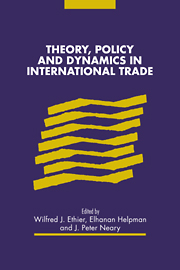Book contents
2 - Ronald Jones and the theory of international trade
Published online by Cambridge University Press: 16 March 2010
Summary
Ronald Jones enters his sixties as productive as ever. This renders a summary evaluation of his contribution impossible: not only is that contribution apparently far from complete, but any judgment today about an accomplishment yesterday might well be nullified by a superseding accomplishment tomorrow. So I attempt no retrospective overview. A collection of article-by-article comments is likewise impractical. Instead I indulge myself with a subjective selection of some of his more important earlier contributions, which offer the most hope for a mature perspective, and which together suggest the nature of the larger body of work.
Trade theory has always been “model oriented.” Indeed, for about half a century debate over which was the “best” model preoccupied a substantial portion of theoretical activity. Even today trade theorists can be usefully classified by their attitudes toward modelling. One group stresses the advantages of consistent application of a single theoretical structure to diverse issues. At the other extreme are those who emphasize basic ideas while giving little emphasis to the framework (s) in which those ideas are exploited. A third group emphasizes models rather than ideas but allows the choice of model to vary with the task at hand. Jones clearly belongs to this third group. Therefore it is convenient to approach his work by using choice of model as an organizational principle (but not the exclusive principle). This is not to say that his papers have been driven by a concern for model structure at the expense of economic issues. They are, in fact, typically driven by economic issues, but the hard work of choosing the appropriate model has been done before the paper has been written.
- Type
- Chapter
- Information
- Theory, Policy and Dynamics in International Trade , pp. 9 - 26Publisher: Cambridge University PressPrint publication year: 1993

